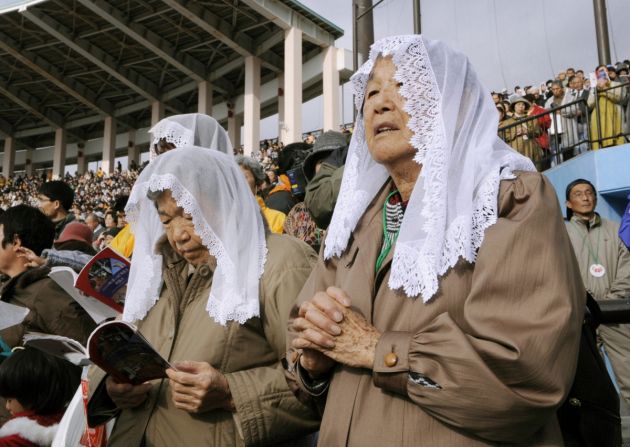Japanese Catholics wane with secular society's pervasion

Japanese Catholics make up less than one percent of the country's population, but they are facing challenges living the faith in a nonreligious society, the nation's bishops have said.
The assessment was published March 17 in a document from the archbishop outlining the conclusions of the archdiocesan synod in 2014, Catholic Herald has reported.
Meeting the Japanese bishops on March 20 during a customary visit, Pope Francis said that even without priests, "the faith of the Christian community did not grow cold."
He said lay Catholics have kept alive "the embers of faith" preached by the missionaries and lived by the Japanese martyrs.
In a published response to the Vatican survey for the extraordinary synod of bishops on the family in 2014, the bishops said most Japanese Christians end up marrying non-Christians.
This affects how many of them receive the sacrament of marriage, attend Mass or baptise their children.
It even affects prayer life, they said: "Because homes where the whole family is Catholic are few, rather than praying as a family, it is more common to pray as individuals."
In the context of marriages of mixed religions, the bishops said, "We must ask what a Christian household and family mean."
They noted, "Generally speaking, the transmission of faith to the next generation is difficult.
"Japanese society does not support expressions of faith commitment, and some young people increasingly perceive the church as a club of the elderly."
The five-page document is published on the Web site of the Catholic Bishops' Conference of Japan.
The bishops said that "Christian family life is being overwhelmed by society's values."
Though children may grow up in a Christian household, they said, "the values they acquire are those of society.
"Made to dance to the tune of a society that emphasises study for the sake of fitting in economically, and desiring to not become social outcasts, young people have no leeway to nurture a vocation. This is the greatest crisis for faith that arises in homes."
In October, Pope Francis called for an extraordinary synod on the family to be held from October 5-19.
In preparation for the synod, its secretary-general, Cardinal-designate Lorenzo Baldisseri, sent bishops' conferences a document.
It included a 39-item questionnaire asking about the promotion and acceptance of Catholic teachings on marriage and the family, and cultural and social challenges to those teachings.
It asks about divorce, remarriage, cohabitation, same-sex unions and contraception.
The Japanese bishops said that, because of the short turnaround time needed to answer the survey, they sought responses from the bishops and major superiors of religious men and women.
The bishops said most Japanese Catholics had not heard of Church teachings on the family and "are either indifferent to or unaware of the teaching of the church" on responsible parenthood.
The bishops said "there seems to not be much of a sense of guilt regarding contraception," and although there are some attempts to teach natural family planning, "few people know about it."
"For the most part, the Church in Japan is not obsessed with sexual matters," the bishops said.
The bishops also mentioned the challenges of ministering to migrants.
Although only about 440,000 Japanese are Catholics, almost a million Catholics live in Japan.
Civic education teaches that sex and procreation are separate, the bishops said, and "women desire more options than just motherhood."